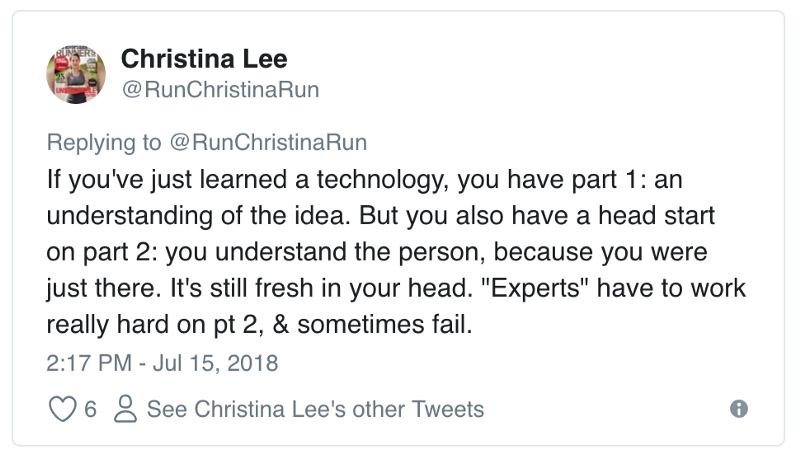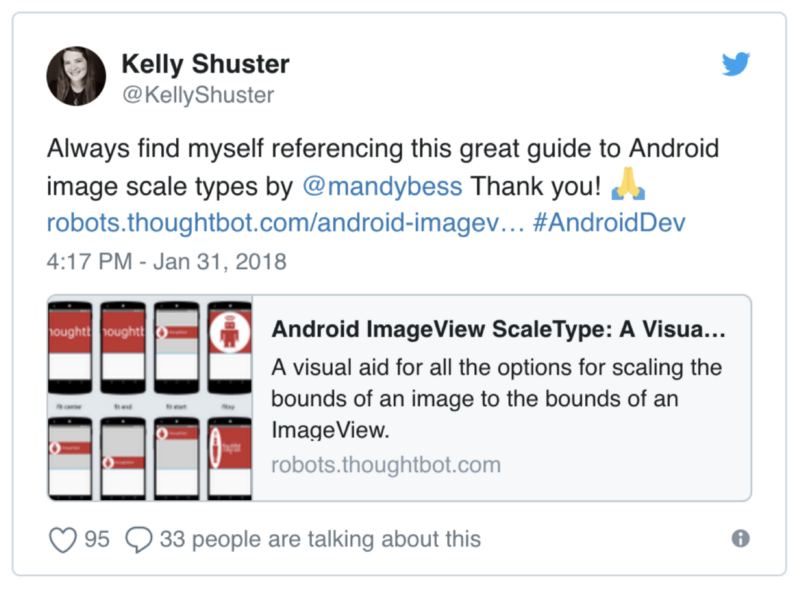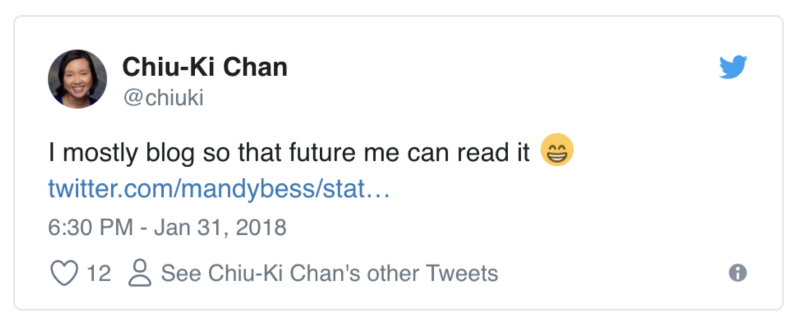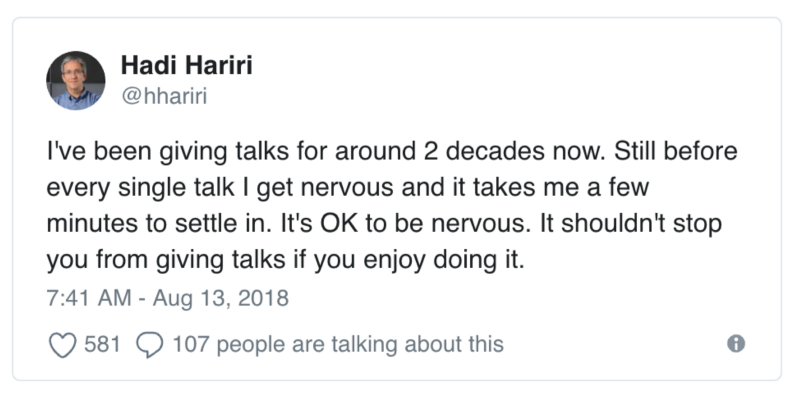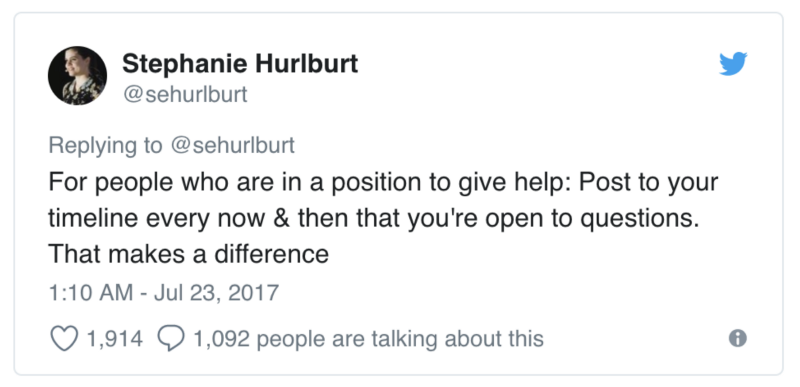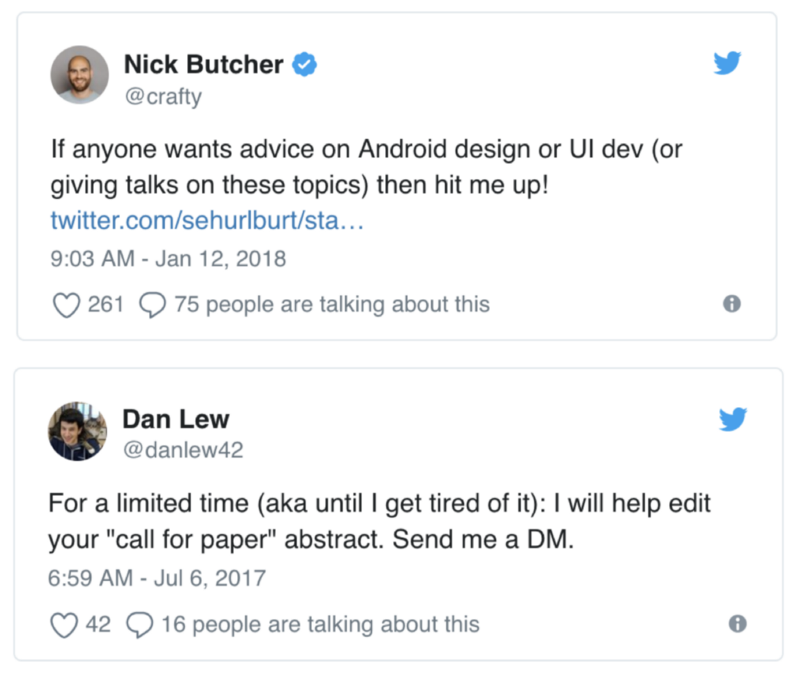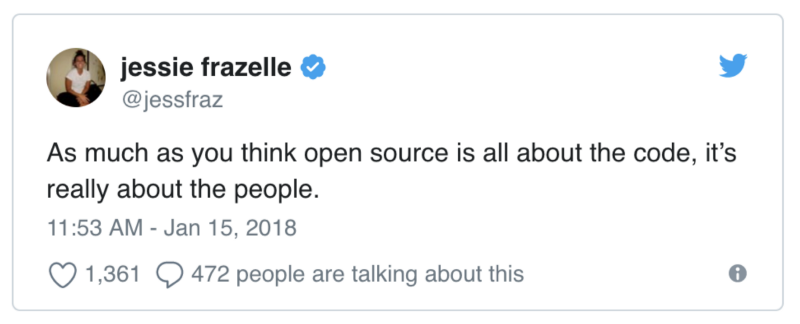If you’ve been paying attention to what’s been going on in our community — conferences, meetups, blog posts, podcasts, open source (the list goes on and on) — you’ve probably noticed a really wonderful energy and spirit behind them all. Yes, our community is healthy and thriving!
And while things are really good today, I do think that we all have a responsibility to think about the future of our community — to really consider what we’re going to do to help shape what it will become, not just for ourselves, but for all the new folks that will be coming into Android for many years to come.
But before we get into the future, let’s take a step back and consider why our community even means so much to us. Why do we even care? The best place I can think to start is my own story.
🤤 My (boring) story
I started with Android back in 2014, which wasn’t really that long ago. I had been writing Java for a long time before that, but didn’t know anything about Android. So I had a bunch of stuff to learn — all the APIs, UI frameworks, etc. were all new to me.
Like many people, a natural place for me to learn was at work, on the job. And that’s exactly what I did. I learned a lot from my coworker Jay. Jay really taught me the ropes and helped me get off on the right foot. He put up the guardrails so I wouldn’t go careening off the side of a cliff.
Turns out though that Jay has a life, a family, and his own work to do. He couldn’t be my personal Stack Overflow, 24/7. So yes, of course, there are limits to what our coworkers can provide. They’re a wonderful people that help us in our projects and day to day work, but naturally they have a bunch of their own stuff to do!
And so like just like everyone else, I started Googling around for resources that would help me become a better Android developer. But what I found wasn’t just a bunch of “resources”. Instead I found an incredibly rich network of teachers.
My peers were out there teaching and offering help without asking for anything in return. They covered every kind of topic and every kind of app. It was really amazing to see, and these teachers became a big, big part of how I learned and got a lot better at Android.
In fact, I’m certain that I don’t reach this level in my career without them. That is why this community means so much to me — I’m literally not here today without the help of all of you out there. So thank you!
I bet a lot of you feel the same way and maybe have similar stories. If you stop for a second and think about it, we’ve all been impacted by these amazing contributions in some way. Think of the conference video that got you really jazzed about something for the first time. Or the blog post that finally, for the first time, helped a concept click in your brain. And of course there’s all the open source work that all of our apps are built on.
And so if you think about how much benefit we’ve gotten from this community and what a positive influence its been on us, here’s a scary thought…
🙀 Can you imagine if this community didn’t exist?
What would happen? Well, for sure our jobs would be a lot harder, they’d be a lot less fun, and a lot less interesting. We’d find ourselves solving the same problems over and over, and it’d get tiring and tedious real fast. I wonder how many of us would even be making Android apps still.
Now of course our community isn’t going to magically disappear or anything like that. But I do think it’s healthy to occasionally reflect on stuff like this — to make sure we don’t take things for granted, and to help us appreciate what we have.
And this thought, as scary as it is, does highlight one really important aspect about communities that people probably don’t think about too often: that sustaining a healthy community is really hard work.
Sustaining any community is tough, and it’s especially difficult to sustain one at a high level like our’s is at. Communities don’t build themselves, they’re not some miracle of the universe. They’re the result of hard work of thousands of well-meaning people, donating their time and effort to help all of us.
I think this can be easy to forget sometimes because there are some folks within our community who are super-pros at doing this stuff. They make it look so easy, you could be forgiven to think that it’s no big deal for them to create these contributions.
But in reality it’s hundreds and hundreds of hours of effort to build these things. Whether it’s maintaining an open source project, prepping a talk, putting on a conference, or the dozens of other types of contributions, these things take a lot of time to put together. And often people are doing this on their own personal time. I don’t say this to make you feel bad for these folks or make it seem like they’re martyrs or something — it’s just to level set how much work really goes into this stuff.
The other thing that makes sustaining a community tough is that Android moves really fast. If you look back 2–3 years almost nothing is the same. Hell, if you look back a few months at Google I/O, almost nothing is the same! This is awesome and exciting of course, but it also means it’s really hard to keep up and cover it all. There’s a wide surface area of topics, and a relatively small number of contributors.
And so because it’s so much work, and because things move so fast, what you often see is that there are natural ebbs and flows to contributions. It’s not uncommon to hear about people taking a break from giving talks, or perhaps you’ve seen an open-source project go unmaintained. Life happens, work picks up, or any number of other factors can play a part, and this is absolutely natural and OK. Of course people deserve a break and should only contribute when it works for them.
But because people are cycling out, we need to make sure that we’re also cycling people in. And so if we truly appreciate this community, and you’ve positively benefited in any way from its contributions…
👉😳 We need you to become contributors
This is especially true for folks who haven’t been super active before. It’s really important to remember that new voices are a key element in moving us in the right direction.
New folks bring many important qualities to the table, but there are two that I really want to highlight.
Your energy. When starting something new, people have a natural energy about them. You’re excited and energized by the possibilities, and that’s important. That energy has a halo effect, not only around those you’re with every day, but also to other members of the community — that energy is contagious! When we see someone doing something new and exciting and full of enthusiasm, that keeps us motivated, interested, and energized too.
Your diverse perspectives. We don’t want to become a stagnant community of unchangeable ideas. New people naturally bring in fresh ideas, new angles, new ways of thinking, tend to challenge the status quo, and bring up issues that we might be blind to.
These two qualities are really, really important for us to have within our community. But unfortunately, a lot of times when encouraging new folks to get involved, there are a couple common retorts that I’ll hear.
“I have nothing new to say.” There’s this common misconception that people have. This idea that “I have nothing to contribute” or “Everything I would talk about has already been said by someone else.”
And while I understand where you’re coming from, I’m sorry to say you’re 100% wrong. You do have something to say whether you realize it or not.
Here’s the thing: the sum total of your life experiences, everything that’s gotten you to where you are today — your journey, your struggles, your successes — are incredibly unique and valuable. And because of that, someone out there can learn from you.
Even if by some chance you and I had the exact same skill level and were giving talks on the exact same topic, there’s no way that it would impact the same people the same way. Your unique vision of the topic, how you express it, and your perspective that’s been built up all your life carries an inherent value that nobody else can recreate. End of story.
“I’m just a beginner.” This is the other thing I’ll hear a lot — this idea that “I’m just starting out and I’m not an expert”. But what you may not realize is that, in some ways, being a beginner is a huge advantage that you have. How can that be?
There’s this wonderful quote by Kim Scott, the author of Radical Candor. In it she says…
“The essence of making an idea clear requires a deep understanding not only of the idea but also of the person to whom one is explaining the idea.”
That makes a lot of sense, right? Now I could expound on this, but why do that when my esteemed colleague Christina Lee has already done that so eloquently.
Exactly! You were just in the person’s shoe’s, of course you’re in an excellent position to explain it to another beginner more clearly than an “expert”. Some of us are so far removed from being a beginner that sometimes we’re not good at teaching — we can glaze over important steps, make a lot of assumptions, and even use different language. But as a beginner, you are immune to all of that, and that in many ways makes you a perfect teacher.
All that to say, you have to get those negative thoughts out of your head. Forget this idea that you have nothing to say, that you’re “just” a beginner, or whatever other doubts you might have. I guarantee you every contributor has said this or something similar before they got started.
The thing that’s hard to see until you jump in is that this is one of the most open, accessible, and encouraging groups of people you could be a part of. Everybody is, in my experience, incredibly nice and willing to help other get started.
A quick story — a little while back I was thinking of doing my first talk. I had never even submitted a proposal much less give a talk, so I had no idea what I was doing. I saw that Android Summit was coming up, and it looked like a good place for me to get started and so I was interested in submitting a proposal.
But like I said, I hadn’t the slightest idea what i was doing. So I looked up who had previously spoken there, and I saw that Huyen Tue Dao had given a talk the previous year. Now at this point, you have to remember, Huyen and I aren’t friends. Hell, we had never even talked to each other before. But out of the blue I sent her a message and asked for her opinion.
It was incredible! She gave me so much encouragement and advice, I could barely believe it. I went in the conversation cold and anxious, and came out excited and enthusiastic. And remember, we didn’t even know each other at all! Here’s a tiny excerpt of what Huyen told me from that conversation:
“Yes, you should totally propose a talk. Do it. End of story. If you have any questions let me know. You gotta go for it. Would love to help. You’ll do great! Let me know!”
That is an amazingly warm, open, encouraging way to treat someone you don’t know! To that end, I think it’s a wonderful embodiment of what our community is like.
The other thing that’s tough to realize until you get going is what an immensely rewarding experience being a contributor can be. If you think about it, there aren’t many professional endeavors where you can…
- Help others, teach, and pay forward all the things you’ve gained
- Make new friends and contacts all across the world at many companies
- Improve your own skills and your career prospects, at the same time
If nothing else, those are three pretty damn good reasons, don’t you think?
🙌 So you’re convinced, right?
I hope at this point you’re convinced that our community is immensely important and valuable, that you absolutely have an important voice, and that we need as many people as possible to contribute to keep things going in the right direction.
So your next logical question might be, “OK, what do I do now? How do I start?”
Well lucky for you I’ve thought of four ways you can contribute. Each one is a little bit different, and I picked them because I think they might appeal to a range of different personality types. I hope there’s a little bit for everyone here. I’ll go into each one broadly and give you a few tips on how to get started. (These four are, of course, not the only things you could be doing, just the ones I happened to pick.)
Let’s get started!
✍️ Contribution #1: Writing
Writing is really near and dear to me, and it’s one of the most important skills you can have. I think many of us have probably read a blog post at some point that had a big impact on us or helped something really click for the first time. And given that so much of our work is writing — chatting, pull requests, feature descriptions, etc. — you could argue that it’s a vastly under-appreciated skill.
Specifically, there are a few things that make them immensely useful to our community.
It’s information dense. The written form is capable of carrying an awesome amount of information — they’re often packed with diagrams, explanations, and code snippets. Pound for pound, nothing can really match a written post for learning, especially compared to something like video or audio.
It’s self-paced. People can absorb the information at their own pace, which is really, really important for learning. I don’t know about all of you, but I usually have to read things at least twice to make any sense of something, sometimes more. Others can probably blow through stuff very quickly the first time. But that’s why it’s great — no two people learn at the same pace, and writing is by far the easiest way to guide your own pace (again, compared to something like audio or video).
It’s an excellent reference (basically forever). Once you’ve created something, you’ll find that it serves as an excellent reference on that topic for many years to come, especially if it’s on a topic that doesn’t change that often.
There’s this great tweet by Kelly Shuster regarding an article that Amanda Hill wrote a while back on image scaling types, and she’s absolutely right. Being able to go back to that article, time and time again, is a huge win.
Our friend Chiu-Ki Chan has expressed a similar sentiment, saying how she often writes to serve as a reference to herself, which is tremendously helpful too.
So if writing sounds like something you might be into, a few things to keep in mind.
Writing tip #1: Practice editing (a lot) ✂️
When you first start writing, one of the hardest things to do is to write clearly. And one of the best ways to improve clarity is to edit.
I read so many things every day that could benefit by a good round of editing — an email, a blog post, a news article, and so much more. Now this isn’t a criticism of those writers, far from it. I think it’s just a reflection of how hard it is to consistently write clearly. Hell, I struggle with it plenty, too. It’s a learned skill and it takes a while to get good at it.
Editing is a big topic so I don’t want to get too deep into the nuts and bolts of it, but there are three “types” of editing that I think would serve you well when writing for the community.
Cut the fat. I think this is probably the one that most people think of as editing, and rightfully so. Condensing everything to the bare minimum, using as few words as possible, and still clearly expressing an idea is incredibly important.
But there are two other kinds of editing that I think people sometimes forget about.
Revise and reorganize. A lot of times a good round of editing isn’t just about cutting things out. At some point there’s going to be a diminishing return for paring down your words too much. Sometimes editing is just about moving stuff around — moving a paragraph, sentence, or even just a single a word— to improve its clarity. Don’t forget that!
Use simpler words. One of the easiest traps to fall into is using complex language. I do this all the time too, I think because it makes me feel really smart or witty. But the reality is that if you have a choice between a simple word or a complicated/fancy one, always pick the simpler one. It will almost always serve you better, be easier to understand, and therefore will be more valuable to the reader.
Bottom line: editing is absolutely crucial to writing well. Practice early and often!
Writing tip #2: Claps are not a measure of success, impact, or value 👏🚮
It seems like every site these days has some way of providing “positive” feedback. Twitter has hearts, Medium has claps, and on and on.
And sure, I’m not going to lie to you, it feels good to get a lot of those. If you write on Medium and you get a ton of claps, it feels like you did something great and important — like you really struck a chord with people.
But if we’re being honest with each other, they’re all bullshit metrics.
From my own personal experience, some of the best things I’ve written that I was most proud of got very few claps or attention. And some of the most outrageous, antagonizing shit that I wrote got an absolute ton of claps. Does that make the latter more successful or more valuable?
Of course not. You absolutely cannot measure the impact that your writing can have by some arbitrary metric like claps, which are designed for Medium to get readers and clicks, not to serve your writing.
I really want to drive this home because sometimes new writers will think “Well, nobody clapped for my writing, so I’m not helping anyone. There’s no point in continuing.” And while I understand why you might feel that way, I urge you to persevere.
It’s possible that your work will live on for years and years, and eventually find its way to helping someone. Plus, how do you really know that it hasn’t helped someone? As unfortunate as it is, we often don’t read something useful then go through the trouble of contacting the author and tell them how much we appreciate it. For all you know, your article has made a tremendous impact on someone, they just didn’t go through the trouble of going back and saying thanks.
And worst case, remember you’re not just helping others, you’re helping yourself! I guarantee you that while you were writing the post, you learned something useful. And on top of that, you’ve got a wonderful bit of writing for your portfolio.
Don’t get too hung up on these bullshit metrics. You’re creating something useful, giving back to our community, and building up your skills and portfolio at the same time. Forget the claps and focus on the writing.
Writing tip #3: Have a strong opinion 💪
Don’t be afraid to tell it how you see it. We talked earlier about how writing clearly is one of the hardest things to do, and this is another way to really improve that.
Having a strong opinion means you are inherently being clear. When you’re being direct, that’s clarity. When you’re being wishy washy or qualifying every statement with “You may not all agree, but I think…” then your writing and clarity suffer badly.
Now of course that doesn’t mean you’re not responsible for what you say — far from it. You are absolutely responsible for being respectful, accurate, and convincing. But while doing that, be confident, be convincing, and say what you mean.
And hey, if everyone doesn’t agree with you (which they certainly won’t), don’t fret. Discourse, discussion, and disagreement is a normal, healthy thing in a active community. If you’ve riled up a few people and got ’em thinking, you’ve done good.
🗣 Contribution #2: Speaking
If writing isn’t your thing, maybe you’d rather just say it from a stage?
Speaking definitely isn’t for everyone — it’s insanely nerve-racking and an absolute ton of work. We’ve all heard the statistic of how people fear public speaking over death, right? Sounds like a blast!
The good(?) news is that this doesn’t just affect new speakers. Even the most experienced speakers run into this. Hadi Hariri, Kotlin guru and developer advocate at Jetbrains, aptly said:
Pretty damn accurate! So given how terrifying and hard it is to do, why would anyone want to do this? Well, there’s one amazingly thing that speaking can do better that no other medium can do…
Speaking is the single best way to inspire and motivate.
If I think back on the things I’ve often been motivated or inspired by, they’ve been talks. Whether they were conference talks about technical topics or a a Ted talk about life, these speeches have always had the greatest impact on me. Writing and reading are awesome, but they simply don’t convey the same kind of energy and excitement as someone speaking on stage. This is why people go see live events!
Another reason you might be interested? Well, speaking is “fun”, in sort of a sadistic, strange away. There is an amazing burst of excitement and energy that you get as your talk gets close, and nothing gets your ass in gear faster than a speaking deadline. And when it’s all done and you walk off that stage, it feels really rewarding when you pull it off.
And lastly, speaking has the potential to open up new opportunities for you. Donn Felker has this great article that he wrote a while back about the first time he publicly spoke. He talks about how he blacked out and all the nerves, but the most important thing he said was this:
“That one day led to many job offers…to do bigger and better things…I decided to jump and go work for myself as a consultant. How? All from speaking.”
For me the opportunities weren’t so much professional as they were personal — the connections and friendships that I’ve made from speaking are the most important “opportunities” that I was able to unlock. I’ve met some truly incredible people and developed friendships that I would’ve never otherwise.
So, if that sounds like your cup of tea, what are some things to keep in mind?
Speaking tip #1: There’s no right or wrong way to start 👆👇👈👉😕
When you first start thinking about speaking, you’re going to have a lot of questions. Where do I do my first talk — brown bag, meetups, conference? How should I prepare? What topic should I discuss? How do you write a CFP?!
And while of course those answers do matter, the key isn’t to get those answers — the key is to START.
Start down the path you think is right. What you want to avoid is becoming completely paralyzed from being unsure and trying to do everything “right”. Try to start answering those questions yourself, and see what you come up with.
After you’ve gotten going, start soliciting for help. Ask people for their opinions and work them into what you’re doing. But at the same time, don’t take any advice as gospel. It’s important to remember that ultimately it’s going to come down to knowing yourself and doing what you’re most comfortable with.
As an example, I’m really weird. The first talk I ever did was at a conference. I prepare by writing my slides and practicing by myself — literally nobody ever sees my talk before I do it. I pick a topic I’m interested, and I write the CFP myself without any feedback.
That works for me. If you couldn’t tell, I’m fiercely independent and slightly neurotic, so I tend to do a lot of stuff myself. So far it’s worked out fine for me, but it’d probably be terrible advice to give to most everyone else.
So yes, take the input from others. But most of all understand yourself, what your preferences are, and get started.
Speaking tip #2: Be yourself on stage 🤪
Another thing that’s tough to do when you’re just starting off is figuring out your “style”.
If you’ve ever seen me on stage, I wave my hands around like a madman. My slides are brief and have a bunch of silly emoji on them. If you’ve ever seen Mark Allison speak, he opens with a magic trick almost every time. If you’ve ever seen Christina or Huyen speak, they do live coding. I wouldn’t dare attempt either of those as I’d probably kill someone.
It’s easy to think that just mimicking someone else’s style is the answer, but it most likely isn’t. You’ll ultimately need to find a way to do things that feel natural to you. And while it might take some work and introspection to figure that out, the biggest benefit is that it’s going to make preparing and presenting a lot easier. When you practice by doing what comes naturally to you, it makes the final show on stage a hell of a lot easier.
And remember, people are there to see you, so be yourself! Of course they’re interested in the topic, but they came into that room to see you talk about it, not someone else. Be proud, be confident!
Now all that said, there are some tactical things you’ll want to avoid. Chet Haase has this great talk called “Top Tips for Terrible Tech Talks” that’s worth a watch.
It’s satirical and funny, but at its core has some really good tips on some of the tactical things you’ll want to avoid in a talk. Highly recommended.
Speaking tip #3: Don’t forget, we’re rooting for you! 🤗
This may sound obvious, but it bears repeating especially when you’re anxious on stage: we want you to do well!
Literally nobody wants to go back to the office and say, “Wow, I saw Dan completely implode on stage. It was a disaster and it was awesome!” We want to go back and say how much we learned, how great the talk was, and how inspired we are to get cracking on something new. What you as a speaker want and what we as an audience want are exactly the same.
You’ve done the work, so relax. Execute. You’re ready. And really, what’s the worst that happens? You flub a couple lines? Nobody will notice. You fall of stage? Hell, you’ve got an amazing story to tell.
And remember, when it’s over, it’s over. It’s a success no matter what because you accomplished something that most people can’t. Be proud of that and don’t look back or nitpick your work. You did it!
🧙 Contribution #3: Mentoring
This type of contribution is for folks who aren’t really into putting themselves out there in a public space that reading and writing demand. But that doesn’t make it any less important and valuable, not by a long shot.
So many people need mentoring, but I think it can be easy to forget how hard is to be a beginner who is just getting started. When you’re just starting out (if you can remember) you crave direction and guidance, and it can be hard to find that.
What’s wonderful about mentoring is that you can provide exactly what people are looking for. Even better, the work you put in doesn’t just have a positive effect for a few months — you’re setting someone up for long-term success. You’re establishing the foundation of how they’ll do their work for years to come, and that has a compounding effect for all the people they’ll eventually work with and mentor themselves.
And I have to say, there is nothing like seeing someone grow right in front of you, sometimes far beyond you. It’s by far one of the most rewarding things you can be a part of.
So if that sounds like something you’d want to do, here are some things to keep in mind.
Mentoring tip #1: 100% expertise is not required 📚
It probably goes without saying, but you can’t possibly know everything. But sometimes I think people avoid becoming mentors because they feel like they don’t know “enough”, when in reality they probably know plenty.
What’s more important than having all the answers is to be able to show your approach — to share how you think about things and work a problem. That’s almost as important as any answer you can give.
In fact, showing that you don’t have all the answers and make mistakes is a wonderful thing too. When beginners see more experienced folks struggle, it’s a welcome reminder that we’re all just figuring this out as we go.
Mentoring tip #2: Advertise yourself 📢
Another thing that’s easy to forget is that as a beginner, it’s hard to ask for help. So let’s flip it.
As someone with experience and knowledge to share, put yourself out there — whether that be publicly, at work, or just on a small team. This doesn’t have to be formal or some big announcement, but it should be specific. If you’re talking to someone and want to offer help, say so. Tell them you are willing to help out or mentor, directly. that’ll make it a lot easier for someone just starting off to approach you when they need help.
There’s this great tweet from Stephanie Hurlburt from a while back that really nails it:
And what’s been great is that within our Android community, we’ve had people offering this exact kind of help publicly:
- https://twitter.com/crafty/status/951816925956407296
- https://twitter.com/danlew42/status/882931899982684160
It’s just wonderful seeing people in our community do this. And by the way, if you haven’t taken up Nick or Dan on their offers, you should!
And remember, there are a lot of different ways to help. No mentor/mentee combo is the same. You can offer to informally review someone’s work, go through code or a pull request, or even just sit down and shoot the shit. It depends on your dynamic and what the person is looking for.
Being a beginner is hard, so let’s make it easier on them and help build our community from the ground up.
Mentoring tip #3: Provide guidance, avoid answers 👩🏫
Said another way, be a teacher, not an encyclopedia. Anyone can look up an answer on Stack Overflow and implement it, but it’s much harder to understand the thinking behind a solution. And really that’s what matters.
Your goal should be to guide them toward an answer, rather than give them the answer. Giving the person an opportunity to think and problem solve is ultimately going to make them a better developer in the long run.
One of the most common, convenient ways to do this is in a pull request. Instead of offering specific code solutions, consider just asking questions. Instead of pasting in a code snippet, ask “Have you considered trying this approach” and offer up a pseudo code alternative.
Sure, there are going to be times when a specific answer is going to be exactly what the person needs, but more times than not, the path toward an answer will serve them best in the long run.
👩💻 Contribution #4: Open source
OK, this is the big one, the one we all rely on. Perhaps it goes without saying, but this is an excellent, excellent way to give back — you could argue it’s the most important. I probably don’t need to tell you why it’s so important, but I’m going to anyway. 🙉
First, you can make a huge impact. Obviously if you make a library that a bunch of developers use, your work will directly be impacting thousands and thousands of customers. Your impact will enormous, which you have to admit is pretty damn cool.
Secondly, and I think somewhat overlooked, is that working on open source is a powerful way to learn. At work you usually end up working on the same closed source app, with the same people, and the same patterns. This isn’t a bad thing of course — that kind of continuity and stability is wonderful.
But when you work in open source, you can learn a bunch of new ways of doing things. You learn how other people and teams operate. You learn other ways of approaching problems. You consider different factors when you’re not writing closed source. The list goes on and on. By doing something out of the norm from your “regular” work, your opportunity to learn grows tremendously.
Finally, working on open source is an instant resume builder. When we hire programmers, the first thing we do is ask for code to look at, because that’s the thing that matters the most (at least to start with). The problem is when you’re looking for a new job, a lot of times your old company is not exactly going to be offering for you to take their closed source code with you to show off.
The great thing about open source is that you have a portfolio ready to go. At any moment you can point to the work that you’ve done in open source and any prospective employers can immediately see the breadth and depth of your contributions. That makes you immediately more marketable.
Sounds good right? Here are a few tips to get started.
Open source tip #1: Every little bit helps 🦐
As you get started in open source, remember that your contributions don’t have to be huge. You don’t have to work on some major overhaul of a project in order to make your mark.
There are a bunch of little things you can do: fix a small issue in the issues list, update the README or fix up some documentation, or even just log a well-documented bug. These may not sound like important contributions, but they’re very helpful to maintainers. Everybody wins when you tackle some of the small stuff.
As you get more comfortable, you’ll find yourself naturally working into bigger issues and bigger sections of the code. Just give it time — starting small is great.
Open source tip #2: Discussion is good, code is great 💻
A lot of times on Github you’ll see really long discussions on how to implement something, and that’s a good thing. Discussion and discourse is usually a solid path toward well-designed solutions.
But sometimes discussions stagnate, start to get nitpicky, or just completely derail. There’s no exact formula to recognizing it, but you know it when you see it. And it’s times like that where code is great.
Code cuts through all of the noise. It’s a real implementation that can be discussed in concrete terms, not abstract ideas or theoreticals. You can bake off different approaches and determine the pros and cons of each. You can see everything in front of you instead of trying to piece together half-formed ideas from multiple people in your head.
If you’re ever in doubt on what to do on an open source project, just write code. Maintainers love pull requests and real implementations.
Open source tip #3: Be friendly and respectful 🤗
When a bunch of people are working on an open source project, you have to remember that it’s likely that these folks are spread across many continents, speaking many different languages, with backgrounds from many different cultures.
Personalities plus a thousand other variables makes interactions unique and probably a lot different than you’re used to. Miscommunications can happen. A lot of times people are working on open source on their own time. And even for those doing it professionally, it’s not an easy task to wrangle all those people and personalities.
So remember, generally speaking people aren’t trying to be dismissive or rude. More likely they’re just trying to be direct and cut to the chase. And hey, if you’re not sure and something makes you feel gross, you can always choose to take the (much harder to travel) high road and keep things positive.
Jessie Frazelle had this great tweet from a while back that summarizes it perfectly:
So that’s it — four areas that you can contribute to. I hope there’s something there that appeals to you. But if not, there are dozens of other ways to be an active member of our community. Find your niche! If you haven’t been super active before, I’d really encourage you to think about how much our community has meant to you and how much you can help others.
🎬 One year ago
The last thing I want to leave you with is this: one year ago, I hadn’t given a single talk, not one. And just a couple weeks ago I was standing on stage giving the opening keynote at Droidcon NYC.
Now I’m not saying that to make it sound like I’m hot shit or that I accomplished some amazing feat.
No, I say that to give you perspective. If you start today, who knows where you’ll be three months, six months, or a year from now. You could be the most eloquent writer, a prolific open source contributor, or a world renowned speaker. The key is that you just have to start now.
I can’t wait to see what you all come up.
Note: This was a transcription of my opening keynote from Droidcon NYC 2018 that I did from memory, so it’s not an exact 1:1 from the talk. If you want to see the actual talk, I’ll link up the video when it’s up. Here are the slides from the talk if you’re interested. Thanks!
